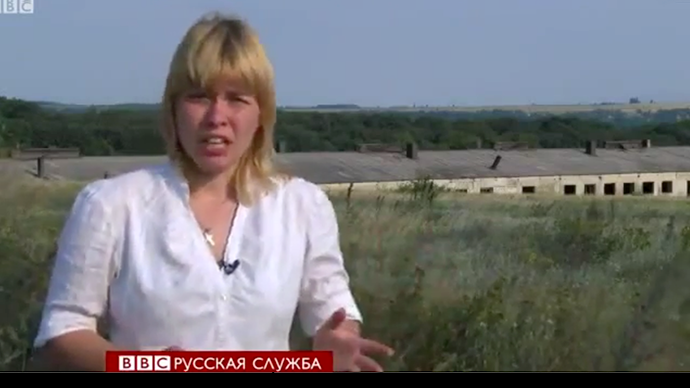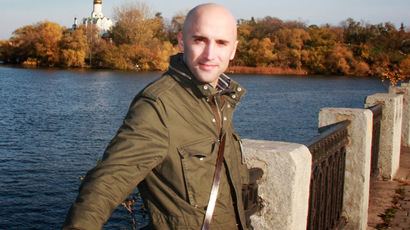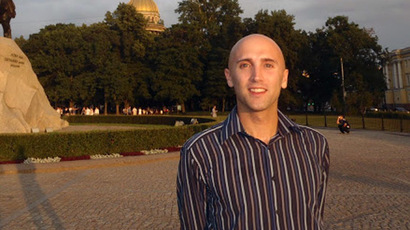Censorship or error? Internet criticism for BBC removal of MH17 report

BBC Russian has come under fire from internet users after deleting its report on the MH17 crash for not meeting ‘editorial values.’ The reporter questioned says that local militia fired the missile, with locals talking about Ukrainian army planes.
The report on the Malaysian plane tragedy by BBC Russian correspondent Olga Ivshina was released on July 23. She interviewed local witnesses who told her that they saw military aircraft in the sky before the incident.
“And there was another aircraft, a military one, beside it [the Malaysian plane]. Everybody saw it,” said one witness.
“It was flying under it [the Malaysian plane], we could see it. It was going underneath the civilian one,” added another.
The report contained a soundbite of an SBU official, saying that the aircraft was shot down by a Buk missile.
“This was a BUK M1 system which shot the aircraft down. It came to Ukraine early in the morning on the 17 July. It was delivered by a tow truck to the city of Donetsk,” Vitaly Naida said.
“After that, it was redeployed from Donetsk, as part of a column of military equipment, to the city of Torez, to Snezhnoye, and to Pervomaisk.”
Ivshina also tried to find a place depicted on photos provided by Ukraine’s Security Service (SBU) which, in their opinion, prove that the Boeing was shot down by a Buk missile system by self-defense forces. She found the place which she assumes is the spot based on landscape characteristics.
“It must be noted that, in an area where fighting continues almost unabated, there is a coalmine and also the Saur-Mogila memorial nearby. It turns out that the smoke could have been coming from any of these locations,” she says in her piece to camera.
Ivshina claims she didn’t see any traces of Buk missiles and says that neither did the local residents.
In the meantime, the commander of local self-defense forces in the city of Snezhnoe, in the Donetsk Region told Ivshina that they have no weaponry capable of shooting down a jet fighter flying at high altitude.
“They [Kiev troops] use these civilian aircraft to hide behind,” he told Ivshina. However, he added that if self-defense troops had such a weapon, then they would have tried to down the jets.
In the meantime, the piece doesn’t draw any conclusions about who was behind the plane crash.
Report which didn’t meet “the editorial values of the BBC”
As soon as the report was published on the BBC website, it was immediately deleted. “Document is not available”said the page.
The video of Ivshina’s report, released on YouTube, was repeatedly deleted, according to YouTube users.
“Video Deleted YouTube,” read the description.
The deleted page immediately sparked the attention of social media. The report itself wasn’t deleted. The bloggers and twitter users accused the BBC of censorship.
“Why are they [BBC] deleting this video?” wrote one YouTube user. “They [BBC] are standing for democracy and the freedom of speech or those who deleted the video, don’t need truth?”
On Thursday, Yan Leder, a managing editor from the Russian service at BBC explained that the report was removed as it contained “mistakes.”
He added that the report had “imperfect structure” and “incomplete compliance of the editorial values of BBC.”
“Unfortunately in this case the report wasn’t submitted to BBC standard editorial analysis. As a result, there were several omissions [in the report],” he added.
According to Leder, the correspondent should have asked the witnesses “specifying questions” in response to their accusations and include “experts’ opinion in her report.”
“That’s why we are modifying the material so that it would (sic) meet the editorial standards of BBC.”
Leder added that Ivshina’s report will soon be published on the BBC website.
However, the explanations from the BBC Russian chief apparently didn’t satisfy readers.
The bloggers believe that the reasons for removing the article might have been the interviews with local witnesses, who said that the Kiev military were using civil jets as cover, and the statements from self-defense forces who say they don’t have missiles capable of hitting targets at high altitude.
“I have been with you [BBC] for 15 years and that case is disgusting,” said one user.
Another criticized the BBC of being biased.
Yet another reader queried what specifying questions should the women have been asked? They had simply stated that they had seen a military jet near the Boeing? The reader went on to assert that if these interviews are deleted as a result of these corrections, then the BBC will be guilty of non-professionalism and weakness.














